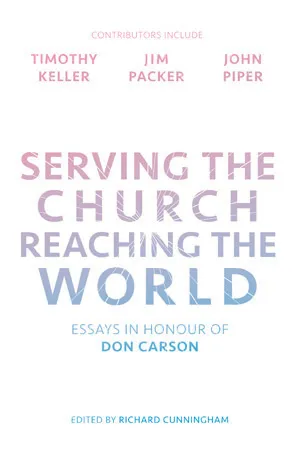SERVING THE CHURCH, REACHING THE
WORLD:
Essays in Honour of Don Carson
Edited by Richard Cunningham
IVP. 171 pages. £9.99
ISBN 978 1 783 595 938
Like many of the contributors to this volume, I find myself, as a Christian and a minister, very much in Don Carson’s debt. For that reason, I consider this festschrift in honour of his 70th birthday to be well-deserved and welcome.
Aside from the worthiness of its dedication, this will be a valuable addition to any minister’s library and required reading for anyone serious about preaching the gospel today. The editor, Richard Cunningham, has assembled an excellent, international, group of contributors whose essays are a worthy tribute to a remarkable servant of Christ and his church.



